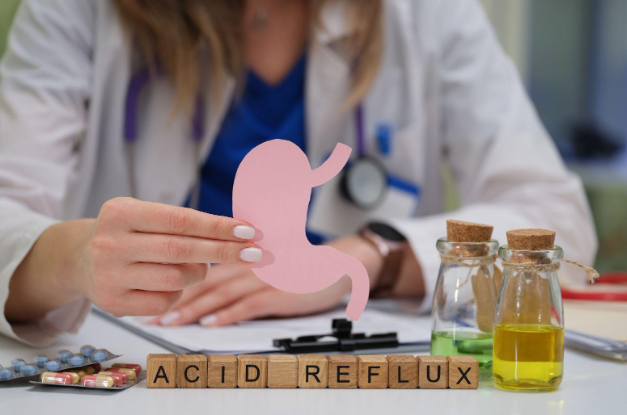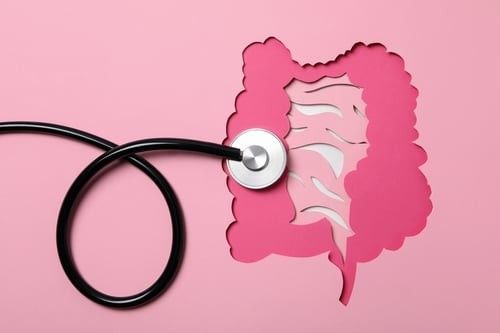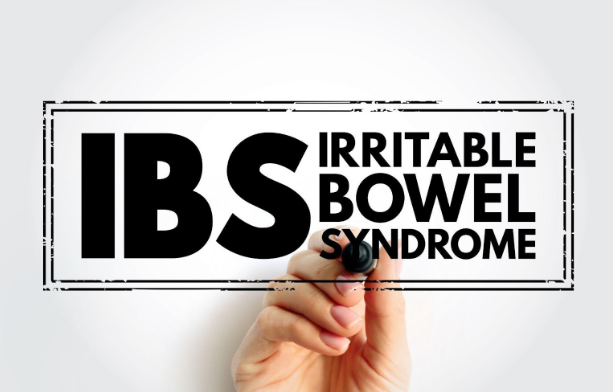Acid Reflux vs. GERD: What’s the Difference and When to Seek Treatment?

Acid reflux happens when the lower esophageal sphincter (LES) doesn’t close completely, allowing stomach acid to travel upward into your esophagus. You might feel this as heartburn, a sour taste in your mouth, or mild regurgitation.
However, understanding the difference between
acid reflux and
GERD can help you make smart choices about when to manage symptoms at home and when it’s time to see a gastroenterologist.
How GERD Develops
Occasional reflux is common, especially after large meals or trigger foods, but frequent episodes can signal something more. The more often your esophagus is exposed to acid, the higher the risk of irritation and damage evolving into a chronic condition known as Gastroesophageal Reflux Disease (GERD).
Sometimes, structural changes, like a hiatal hernia, when the stomach pushes through the diaphragm, prevent the LES from closing properly. Conditions such as gastroparesis (slow stomach emptying) and certain connective tissue disorders also increase your risk. Over time, repeated exposure to stomach acid can cause scarring, narrowing, and even precancerous changes in the esophageal lining.
Recognizing the Symptoms That Point to GERD
Not all reflux feels the same, and not all cases involve the classic burning sensation in the chest. GERD (Gastroesophageal Reflux Disease) can present in a variety of ways, sometimes without any heartburn at all. You should look out for symptoms such as:
Frequent or Severe Heartburn
Experiencing heartburn more than twice a week, especially if it intensifies when you lie down or bend over, often signals gastroesophageal reflux disease (GERD) rather than simple acid reflux. Persistent discomfort warrants medical evaluation.
Regurgitation and Unpleasant Mouth Taste
A sour, acidic, or bitter taste in your mouth, particularly after eating or at night, occurs when stomach acid flows back into the esophagus, sometimes reaching the throat and mouth. Some people may also experience nausea, unexplained bloating, excessive saliva production, or worsening asthma symptoms triggered by acid irritation in the respiratory tract.
Difficulty Swallowing (Dysphagia)
If you frequently feel food getting stuck in your throat or chest, it could indicate inflammation or narrowing of the esophagus caused by chronic acid exposure.
Chronic Cough, Hoarseness, or Throat Irritation
Long-lasting cough, persistent hoarseness, or a sore throat without signs of infection may result from acid reflux irritating the vocal cords or airway, contributing to respiratory symptoms.
Non-Cardiac Chest Pain
Sharp or burning sensations in the chest that are unrelated to heart problems may stem from acid damaging the esophageal lining. It’s important to get these symptoms evaluated promptly to exclude heart conditions.
Nighttime Symptoms Affecting Sleep
Waking up coughing, choking, or with a sour taste can indicate acid reflux occurring during sleep. Nighttime reflux is concerning because acid remains in contact with the esophagus longer, increasing the risk of complications.
Risks and Long-Term Effects
The discomfort and complications associated with untreated GERD can significantly affect daily activities and overall quality of life. Persistent symptoms may lead to sleep disturbances, reduced productivity, and increased healthcare visits.
Esophagitis and Esophageal Ulcers
Persistent acid exposure can inflame the esophagus, leading to esophagitis. This condition may cause pain, difficulty swallowing, and, if left untreated, can result in esophageal ulcers, which are open sores that can bleed and further damage the esophageal lining.
Esophageal Strictures and Scarring
GERD can cause chronic inflammation, which may result in scar tissue and lead to esophageal strictures. These narrowing make swallowing difficult and may require medical intervention to prevent complete obstruction.
Barrett’s Esophagus
Long-term GERD increases the risk of developing Barrett’s esophagus, where the normal esophageal lining changes to resemble the intestinal lining. This condition is associated with a higher risk of esophageal cancer, making regular monitoring essential.
Dental Erosion
The acid from frequent reflux can erode dental enamel, leading to tooth decay and sensitivity. Individuals with untreated GERD may notice increased dental issues due to this acid exposure.
Respiratory Complications
GERD can contribute to respiratory problems such as chronic cough, hoarseness, and asthma-like symptoms. Acid reflux reaching the throat and lungs can irritate airways, leading to persistent respiratory discomfort.
Silent Reflux and Extraesophageal Symptoms
Some individuals with GERD may experience symptoms without traditional heartburn. These include sore throat, chronic cough, and a sensation of a lump in the throat. Such symptoms can be indicative of silent reflux, requiring medical attention for proper diagnosis and treatment.
How Diagnosis Has Evolved
Advanced tools provide detailed, personalized insights that allow healthcare providers to tailor treatments more effectively, especially in complex cases or when symptoms persist despite standard therapies.
Direct Visualization with Upper Endoscopy (EGD)
Upper endoscopy, or esophagogastroduodenoscopy (EGD), remains a cornerstone in evaluating the esophagus. This minimally invasive procedure uses a flexible camera to visually inspect the esophagus for inflammation, erosions, Barrett’s esophagus, or other abnormalities.
Biopsies can be taken during the procedure to detect microscopic changes or rule out infection or precancerous conditions.
Advanced pH and Impedance Monitoring
Recent advances in reflux monitoring have introduced wireless, catheter-free devices that track acid exposure continuously for up to 48 hours. This extended monitoring captures reflux events during normal daily activities and sleep, providing a more accurate picture of acid and non-acid reflux episodes.
- pH monitoring measures the acidity level in the esophagus and is considered the gold standard for quantifying acid reflux.
- Impedance-pH monitoring detects both acid and non-acid reflux, helping to identify reflux episodes that might not register on traditional pH tests but still cause symptoms.
- This technology helps distinguish whether symptoms are due to acid exposure, weak acid reflux, or other causes, which is crucial for selecting the right treatment.
Esophageal Manometry: Mapping Muscle Function
Esophageal manometry evaluates the strength and coordination of the esophageal muscles and lower esophageal sphincter (LES). This test is particularly important when motility disorders like achalasia or esophageal spasms are suspected, conditions that can mimic or worsen reflux symptoms.
Manometry helps pinpoint whether muscle dysfunction is contributing to symptoms, guiding treatment decisions.
When to Seek Advanced Diagnostic Evaluation
While many patients with acid reflux or GERD can be diagnosed based on symptoms and response to initial treatment, advanced diagnostic testing becomes important in cases of: These tests allow providers to assess the severity of the disease, rule out other conditions, and design a more targeted, individualized treatment plan.
- Persistent or worsening symptoms despite medication
- Difficulty swallowing or food getting stuck in the throat
- Unexplained chest pain
- Long-standing reflux with risk factors for complications
Medical Treatments That Target GERD at the Source
When lifestyle changes alone don’t fully control your acid reflux symptoms, medical treatments can help reduce stomach acid, protect the esophagus, and promote healing. Your healthcare provider will evaluate your symptoms, diagnostic tests, and lifestyle factors to recommend the most appropriate treatment plan.
Over-the-Counter and Prescription Medications for Acid Control
Whether starting with medications or moving to advanced procedures, the goal is to control acid reflux at its source, prevent esophageal damage, and improve your quality of life. Options range from over-the-counter remedies to advanced surgical procedures tailored to your specific condition.
Antacids and Alginates
Antacids neutralize stomach acid quickly, providing fast but temporary relief from heartburn. Alginates work by creating a protective barrier over stomach contents to prevent reflux. These are ideal for occasional symptoms but are not recommended for long-term management.
H2-Receptor Blockers
Famotidine and similar medications work by reducing acid production for several hours. They are effective for mild to moderate symptoms and can be used regularly under medical guidance. H2 blockers provide a middle-ground option before advancing to stronger treatments.
Proton Pump Inhibitors (PPIs)
PPIs such as omeprazole, lansoprazole, and esomeprazole are the most potent acid suppressants available. They work by blocking acid production at the source and allowing the esophagus to heal inflammation and irritation caused by reflux.
While highly effective, PPIs should be used at the lowest effective dose and regularly reviewed by your healthcare provider to minimize potential long-term side effects, including bone density loss or kidney concerns.
Procedural and Surgical Options
For some patients, symptoms persist despite optimal medication use, or long-term drug therapy may not be ideal. In these cases, minimally invasive procedures or surgery can provide more durable relief by directly addressing the underlying cause of reflux, the malfunctioning LES.
Nissen Fundoplication Surgery
In this laparoscopic procedure, the upper part of the stomach is wrapped around the lower esophagus to reinforce the LES. It restores the natural barrier that prevents acid from flowing backward. Advances in surgical technique have made recovery quicker and less painful, with high success rates in symptom control.
Transoral Incisionless Fundoplication (TIF)
TIF is a less invasive option performed through the mouth without external incisions. It rebuilds and tightens the LES using an endoscopic device, reducing reflux episodes while preserving normal swallowing function. This option is especially attractive for patients seeking an alternative to traditional surgery.
LINX Reflux Management System
The LINX device consists of a small ring of magnetic titanium beads implanted around the LES. It reinforces the sphincter by using magnetic attraction to keep it closed, but expands to allow food and liquids to pass naturally.
This offers a minimally invasive solution with a quick recovery and is effective for patients with moderate to severe GERD who want to avoid long-term medication.
Practical Steps You Can Take Now
While waiting for evaluation or as part of your treatment, making simple changes can reduce acid reflux symptoms. Consume smaller, more frequent meals, and refrain from lying down for at least two hours after eating. Elevate the head of your bed by 6 to 8 inches to help keep stomach acid down during sleep. Avoid foods and drinks that commonly trigger reflux, such as spicy or fatty foods, caffeine, carbonated beverages, citrus, and late-night meals.
Maintaining a healthy weight, cutting back on alcohol, and quitting smoking also reduce symptoms. Incorporating stress management, like meditation or light exercise, can further support your digestive health. These steps often ease symptoms and may reduce the need for stronger treatments.
Reflux and GERD exist on a spectrum that deserves your attention. If you’re ready to understand the root cause of your symptoms, our gastroenterologists at
Northlake Gastroenterology are here to provide expert diagnosis and personalized treatment plans.
Schedule a consultation with the expert team, and we’ll guide you every step of the way, helping determine when advanced therapies may be necessary for lasting relief.
More Blogs












